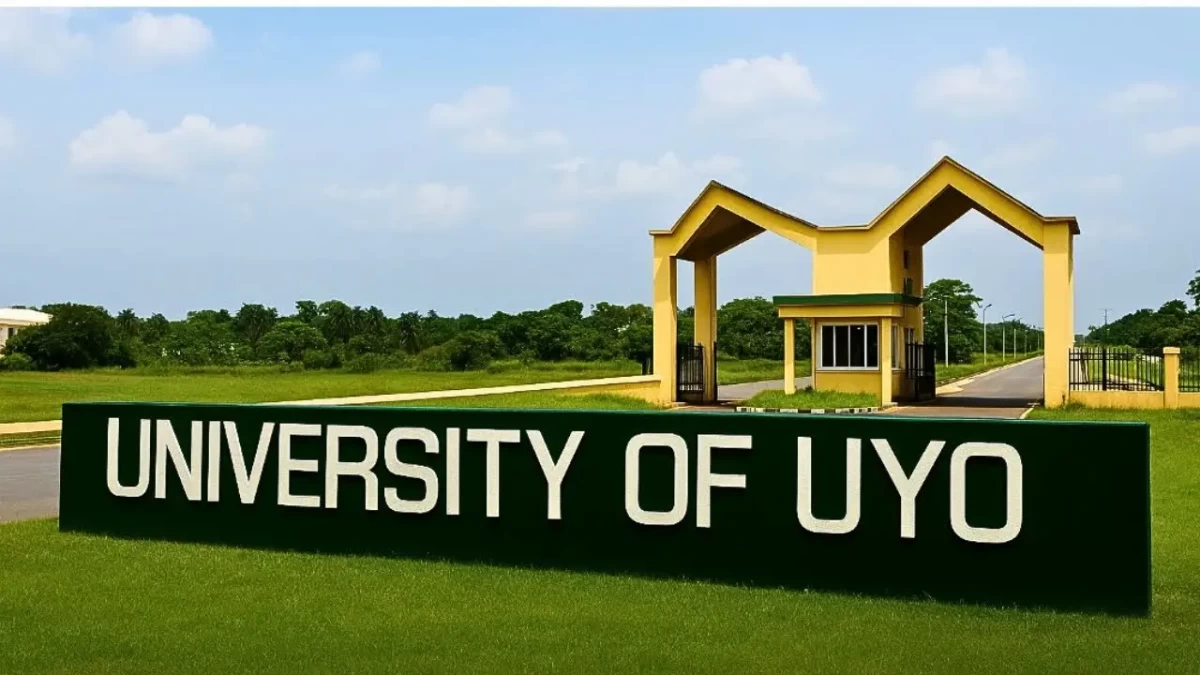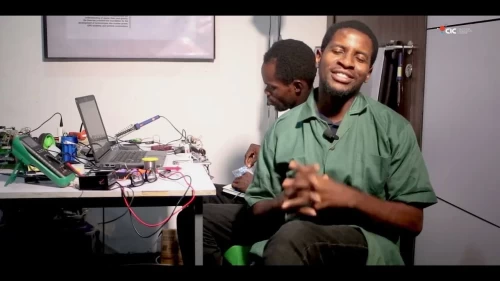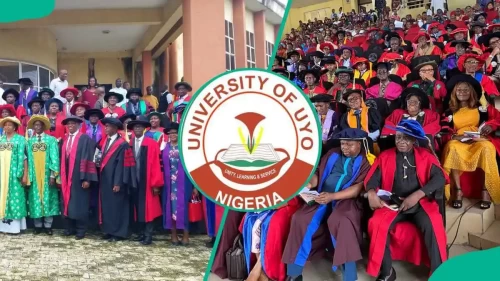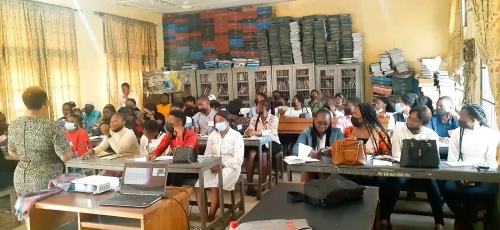The choice of a university depends on many factors which may vary with individuals. Few of many reasons people give why they choose UNIUYO are as follows:
UNIUYO is situated in an easy accessible area from all different locations. UNIUYO is a federal University; the fees are affordable, unlike the state owned universities where they pay exorbitant fees. UNIUYO is the only university in the south-east where Electronics and Computer Engineering has been accredited by the National Universities Commission and COREN. In UNIUYO, admission is strictly by merit. The environment is intimidation and harassment-free, giving no room for cult activities. One can walk around freely at anytime of the day without fear of molestation, and this goes a long way to suggest that the security network is very active. Finally, it is the wish of every student to graduate as and when due with good grades; UNIUYO is known to support this, as it runs an uninterrupted academic calendar year in year out. The transportation system in UNIUYO can only be described as effective and efficient.
| Acronym | UNIUYO |
| Nickname | UNIUYO |
| Motto / Slogan | Unity, Learning and Service |
| Colour | green |
| Founded | 1991 |
| Location | Uyo, Akwa Ibom, Nigeria |
| Address | Ikpa Road, Uyo, Akwa Ibom Ibom State, Nigeria. |
The University of Uyo's mission is to diligently pursue scholarship and deploy its output for human capacity development and economic growth in the society, with active participation in Information and Communication Technology, sensitivity to Nigeria's rich cultural heritage and responsiveness to global environmental changes.
To be a centre of academic excellence by utilizing the available human and technological resources for teaching, research, community service and sustainable development.

UNIUYO is a respected federal institution known for academic excellence, especially in Law, Education, Engineering, and Science programs. Its commitment to research, innovation, and quality education makes it one of Nigeria’s top choices for serious students.
UNIUYO is a federal University; the fees are affordable, unlike the state owned universities where they pay exorbitant fees. Students can also benefit from state and federal scholarships, bursaries, and intervention programs to ease financial burdens.
The environment is intimidation and harassment-free, giving no room for cult activities. One can walk around freely at anytime of the day without fear of molestation, and this goes a long way to suggest that the security network is very active.
The university offers undergraduate and postgraduate programs across multiple faculties, including Pharmacy, Agriculture, Social Sciences, Arts, and Environmental Studies. UNIUYO is the only university in the south-east where Electronics and Computer Engineering has been accredited by the National Universities Commission and COREN.
Acceptance Fee: 30,000
Candidates seeking admission through the Unified Tertiary Matriculation Examination (UTME) should meet the following requirements:
Candidates seeking admission into the University through Direct Entry should posses, in addition to ordinary level requirements, one of the followings:
Email: [email protected]
Phone : +234(0)8145223041

.webp)


the National Universities Commission (NUC)
Nyaudoh Ndaeyo also earned a Master of Science (M.Sc.) degree in Agronomy in 1994 and a Doctorate (Ph.D) degree in Farming Systems in 2000 both from the University of Ibadan, Nigeria.
The new Vice-Chancellor, was first employed on November 06, 1992 as Graduate Assistant with the University of Uyo, 18 years later, he grew through the ranks and became a Professor of Farming Systems in the Department of Crop Science, Faculty of Agriculture on October 01, 2010.
Prof. Nyaudoh Ndaeyo is a seasoned teacher and researcher. He has taught over thirty courses at both the undergraduate and graduate levels and has also supervised over 68 undergraduate projects and 54 graduate theses including doctoral degree students.
During his career in the University, Prof. Nyaudoh Ndaeyo has served as a lecturer, researcher, examinations officer, co-ordinator of several academic activities and programmes in the Department of Crop Science, as well as chairman of several committees in the department.
From there, she proceeded to Adiaha Obong Secondary Commercial School Offot, Uyo for her Secondary School, Eniong School education and obtained her General Certificate of Education (GCE) in 1983. In her thirst for more knowledge, motivated her to further her tertiary education in the defunct University of Cross River State, and by 1988, she bagged Bachelor of Arts (Hons.).
She served and completed her one year mandatory NYSC progrmme in 1989. In order to further broaden her academic horizon, she registered for Postgraduate Diploma programme where she obtained a Postgraduate Diploma in Education in 2001, and Masters of Arts in English in 2007 respectively.
The 8th substantive Registrar began her career as Mistress II in Community Comprehensive Secondary School, Four Towns, Uyo, Akwa Ibom State in 1994 and later transferred her service to the University of Uyo in 2000. This astute administrator with track record of commitment and unbroken loyalty to the University of Uyo has climbed the ladder of the administrative cadre and garnered experience as reflected on all the sensitive positions she was privileged to hold in the University.
Between 2000-2005, Mrs. Blossom Okorie served as Assistant Registrar and Faculty Officer in Faculty of Pharmacy; 2005-2009 – Senior Assistant Registrar and Faculty Officer in Faculty of Agriculture; 2009-2011 – Senior Assistant Registrar and Faculty Officer in Faculty of Arts; 2011-2015 – Principal Assistant Registrar and Head of Academic Staff Establishment, Directorate of Human Resources; 2015-2018 – Deputy Registrar and Secretary, College of Health Sciences. She was the Deputy Registrar and Head of Unit, Directorate of Information and Public Relations before her new appointment.
Young and talented Adamu contemplating on how to bring succor to his people thought it wise to enroll in the School of Rural and Social Studies, Kano in 1981 to 1982. This is a tertiary institution which offers courses leading to the award of National Diploma and Higher National Diploma. It formed part of the Kano State Collegiate System under the banner of Kano State Polytechnic at the time it was established. Between 1983 and 1985, he returned to further his studies in the same institution. He obtained a diploma in Rural and Social Studies. After working awhile, he underwent a course in Public Administration and obtained an Advanced Diploma in Public Administration in 1996 from Ahmadu Bello University, Zaria. He also obtained a 2nd Class Honours degree in Peace Studies and Conflict Resolution from the National Open University of Nigeria in the year 2015.
As a seasoned civil servant, Alhaji Adamu Abubakar Maje served as Social Welfare Officer in Kano State between 1982 and 1988; Kano State Pilgrims Welfare Board, 1988 to 1991; Jigawa State Pilgrims Welfare Board, 1991 to 1998; Senior Personnel Officer, Ministry of Social Welfare, 1998 to 1999.
When first proposed by the President, and Commander-in-Chief of the Armed Forces, the University was to be a Federal University of Technology (FUT) and the Campus of the University of Cross River State at Uyo was to be the nuc... read more
Following representations and series of implementation strategy meetings, it was finally resolved by a letter dated 24th September 1991 that “the Federal Government has decided that University of Cross Rivers State should be converted into a Conventional University instead of a FUT”. Academic activities commenced in 1991/92 session.
What is today called the University of Uyo has a humble but unique historical metamorphosis. The campus where the University of Uyo is situated started in the 1930’s as a practising school and became a Teacher Training College in the 1940’s. It was upgraded to Advanced Teachers’ Training College in the 1960’s.
In 1975, it became a College of Education and was converted to the University of Cross River State (UNICROSS) in 1983. In 1991, the erstwhile University of Cross River State assumed a new status and nomenclature called the University of Uyo, a Federal University. It is a citadel of learning, research and community development.